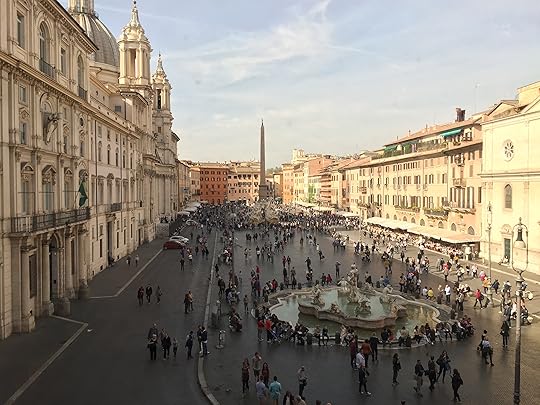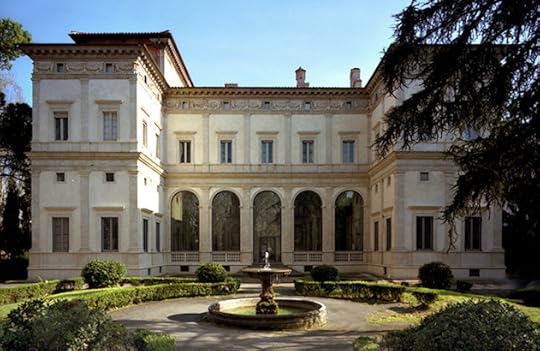Peter Smith's Blog, page 82
April 24, 2017
As good as it gets


We have been to some excellent local concerts over the last few months which I haven’t mentioned here (from the likes of Igor Levitt, Rachel Podger and the English Concert, Cuarteto Casals, and a particularly on-form Academy of Ancient Music with Frank de Bruine). But for my birthday we went up to the Wigmore Hall for a performance of Die schöne Müllerin (yes, quite the cheery choice …). The singer was the young Dutch baritone Hank Neven, his accompanist the truly great Schubert pianist Imogen Cooper. This was an extraordinary performance, one of the most moving concerts we have been to for years, with Neven absolutely compelling and Cooper’s playing magical. The audience was completely rapt; at the end many quiet tears around us needed wiping away … with, as they took their bows, the players too evidently moved by the occasion. This truly was Schubert singing as good as it gets.
April 21, 2017
David Makinson’s Sets, Logic and Maths
 As I go through chapters of my Introduction to Formal Logic, heavily rewriting them for the second edition (only scattered paragraphs are surviving unaltered from the first edition, and I’m adding wholy new chapters too), I’m occasionally pulling other introductory books from my shelves, to check their coverage, to see how they handle particular points and whether they have nice expository ideas I could steal gratefully emulate.
As I go through chapters of my Introduction to Formal Logic, heavily rewriting them for the second edition (only scattered paragraphs are surviving unaltered from the first edition, and I’m adding wholy new chapters too), I’m occasionally pulling other introductory books from my shelves, to check their coverage, to see how they handle particular points and whether they have nice expository ideas I could steal gratefully emulate.
One excellent book which I seem not to have mentioned here before — and parts of which really should get warm recommendations in the Teach Yourself Logic Study Guide — is David Makinson’s Sets, Logic and Maths for Computing (Springer, 2nd ed. 2012). It deserves a full-scale review here: but for the moment, this post is a place-holder, to flag up the existence of this text.
As the title suggests, the book is primarily aimed at computer science students. But the assumed level of mathematical competence is pretty low, and many philosopher students could find this very useful, perhaps as a supplement to more conventionally arranged texts for students one step up from raw beginners at logic. Here, Makinson starts by looking at the kind of mathematical notions which any philosophy student leaning in a logical direction ought to know about — sets, relations, functions; ideas of induction and recursion (and there’s some more, e.g. about trees in the abstract). As he goes along, he introduces logical notions briefly “as they arise in the discussion of more ‘concrete’ material. This is done in ‘logic boxes’. Each box introduces just enough to get on with the task in hand. Much later, in the last three chapters, all this is brought together and extended. By then, the student should have little trouble appreciating what the subject is all about and how natural it all is, and will be ready to use other basic mathematical tools when studying it.”
A great deal of pedagogic thought has evidently gone into the book, and it is very admirably clear, and good at getting across Big Ideas and their motivations without getting bogged down by over-abstraction or unnecessary pernickety detail. So: well worth taking a look at if you don’t know the book (as indeed I didn’t until quite recently).
April 20, 2017
Dennett: losing the plot
I’ve tried to read Daniel Dennett’s From Bacteria to Bach and Back. But I’ve lost the plot, and given up quite early in the book. I seem to now find Dennett’s penchant for metaphors, claims that are “sorta” true, analogies, free-wheeling speculation, his having-his-cake-and-eating-it — perhaps long there in his work, but now out and proud — simply irritating. It’s all provoking but, for me, in quite the wrong way.
Yet it is possible to write about consciousness and neuropsychology and the brain with crisp clarity. Peter Carruthers, for example, repeatedly pulls it off. I’m not saying he is right, for I am in no position to judge: but he gives us detailed, very clearly formulated, evidently falsifiable, theories to assess. Not the sort of stuff to give him guru status, but all the better for it.
April 19, 2017
Going cold turkey
I can’t say I’m surprised that an election has been called. As it becomes clearer and clearer (to the Tories in power — they were warned!) how horribly long and messy and potentially disastrous the Brexit process will be, you can see why Theresa May, her Chancellor, and the other grown-ups in the room will be hoping and praying for a majority large enough to be able to ignore the madder Brexiteers in their party. We shall see.
And that’s going to be my last word on the whole depressing matter here, at least until after the election. I wasted far too much time reading the political news, the commentaries, the deep background pieces, at referendum time, and again with the Trump election. There was no joy in that and I’m not sure I ended up very much more enlightened about what the hell has been going on with us (instant history is rarely good history). So this time around, it is a self-dying ordinance for me. It is already clear, at least to me, how to cast my solitary vote locally. And so, until the day comes round, no more newspapers on the iPad first thing; no more late-night catch-ups; no more long-reads from political writers. I’m going cold turkey.
April 6, 2017
Another postcard from Rome
We always like to go to smaller, less-visited places — not just to avoid the teeming crowds, but also because we find that smaller galleries and churches and palazzi can be more humanly interesting and (not feeling overwhelmed) more enjoyable. Three final highlights of our stay have been seeing a fine exhibition Artemisia Gentileschi and Her Times,
visiting the small but stunningly frescoed Oratorio del Gonfalone, and going to the beautiful Villa Farnesina in Trastevere (above) which has frescoes by (among others) Raphael. Even the exhibition wasn’t busy, and we were the only visitors to the Oratorio (used for evening concerts and other events — you knock on a door in the street behind, and we were shown it by the President of the confraternity). All wonderful.
And for when you’ve finished feeding the soul, a top restaurant recommendation: Pierluigi.
April 1, 2017
Postcard from Rome
 A week or so in Rome, with beautiful sun, some wonderful food, coffees as they should be, quite a lot of wandering around back streets, and a less than frenetic cultural pace visiting a few churches and exhibitions. We arrived just as the not-so-United Kingdom formally triggered the process of leaving the EU. Seems somehow rather appropriate to show our feelings about this folly by leaving the UK for the Eternal City, for however short a time.
A week or so in Rome, with beautiful sun, some wonderful food, coffees as they should be, quite a lot of wandering around back streets, and a less than frenetic cultural pace visiting a few churches and exhibitions. We arrived just as the not-so-United Kingdom formally triggered the process of leaving the EU. Seems somehow rather appropriate to show our feelings about this folly by leaving the UK for the Eternal City, for however short a time.
I must say that I have found the Brexit absurdities plus the Trump fiasco less than cheering. Though having nothing original or insightful to say about either, I’ve not wanted to bang on about them here. But the political news has been lowering and distracting enough to stem the flow of blog posts for a while. A few more days of sun and noisy civilization, and normal service ought to be resumed.
March 7, 2017
February 13, 2017
Raymond Smullyan (1919–2017)
I first came across Raymond Smullyan’s work — surely like many of my sort of vintage — through his wonderfully inventive and illuminating short(ish) paper “Languages in which self-reference is possible” which was reprinted in Hintikka’s 1969 The Philosophy of Mathematics (in the Oxford Readings series). Still more than worth reading, after all this time. And that paper led me to look out his First-Order Logic over forty years ago. I think it took me a while to really appreciate that classic: certainly, I kept battling on teaching first-year students Lemmon-style natural deduction for while before I was fully gripped by the loveliness of trees! I had occasion to read the first half of First-Order Logic again a few months ago, and it is such a delight.
But perhaps even more elegant, clear, readable, illuminating, getting-to-the-heart-of-things, there’s Smullyan at his very best in the three Oxford Logic Guides he published in quick succession — Gödel’s Incompleteness Theorems (1992), Recursion Theory for Metamathematics (1993), and Diagonalization and Self-Reference (1994). They give the lie to G.H. Hardy’s bitter remark that “Exposition, criticism, appreciation, is work for second-rate minds.” Smullyan’s expositions and re-organizations and novel re-appreciations and inventive drawings-out of new connections are surely the work of a first-rate mind.
And then, as a late coda, there is that other great book that Smullyan wrote with Melvin Fitting, Set Theory and the Continuum Hypothesis (1996). Those of us past the first, second, and even third flush of youth can’t but be encouraged and cheered to see Smullyan getting perhaps to the very top of his game, as far as the writing of serious logical texts is concerned, as he moves into his seventies. (The very late books like Logical Labyrinths and A Beginner’s Guide to Mathematical Logic are perhaps too uneven and quirky to really work, but still have fun and instructive episodes.)
I can’t think of a single logician whose writings I have enjoyed reading and working through more than Smullyan’s, and whose elegant lucidity I’d more like to be able to emulate. And there are few logicians that I’ve learnt as much from. So I wanted to mark Smullyan’s passing, as others have, with very warm appreciation and gratitude.
“But what about all the puzzle books? You haven’t mentioned them!” Well, I know that many others have loved them, but I very much prefer my logic served straight up: and I think it would be a sad if Smullyan is mainly remembered for them. I don’t seem to have the kind of mind that is drawn to puzzle books, to magic tricks, or Taoism: but that’s uptight Englishness for you!
February 6, 2017
Setting tableaux using prooftrees.sty
The first edition of IFL was typeset using FrameMaker (long since defunct on a Mac), so I’m having to LaTeX the second edition from scratch. I’m planning to use Clea Rees’s fairly new package prooftrees.sty for downward-branching tableaux, a.k.a. truth-trees, since this seems to give the right level of control over trees and beat other options by some way.
I have therefore added a link on the LaTeX for Logicians page on tree proofs to a document on setting tableaux using this package. This will contain some notes on using the package, e.g. on how to avoid it clashing with busstrees.sty, and on any useful undocumented tweaks I find. And then I’ll also give a few examples, including some constructed for IFL.
I’d be very happy to hear about any tips and tricks for this package from other users that could also be shared at LaTeX for Logicians. (And of course, all other suggestions and corrections for L4L are always welcome!)
January 31, 2017
Since it is Schubert’s birthday ….
Barbara Bonney, soprano; David Shifrin, clarinet; André Watts, piano. Der Hirt auf dem Felsen, “The Shepherd on the Rock”, D. 965




